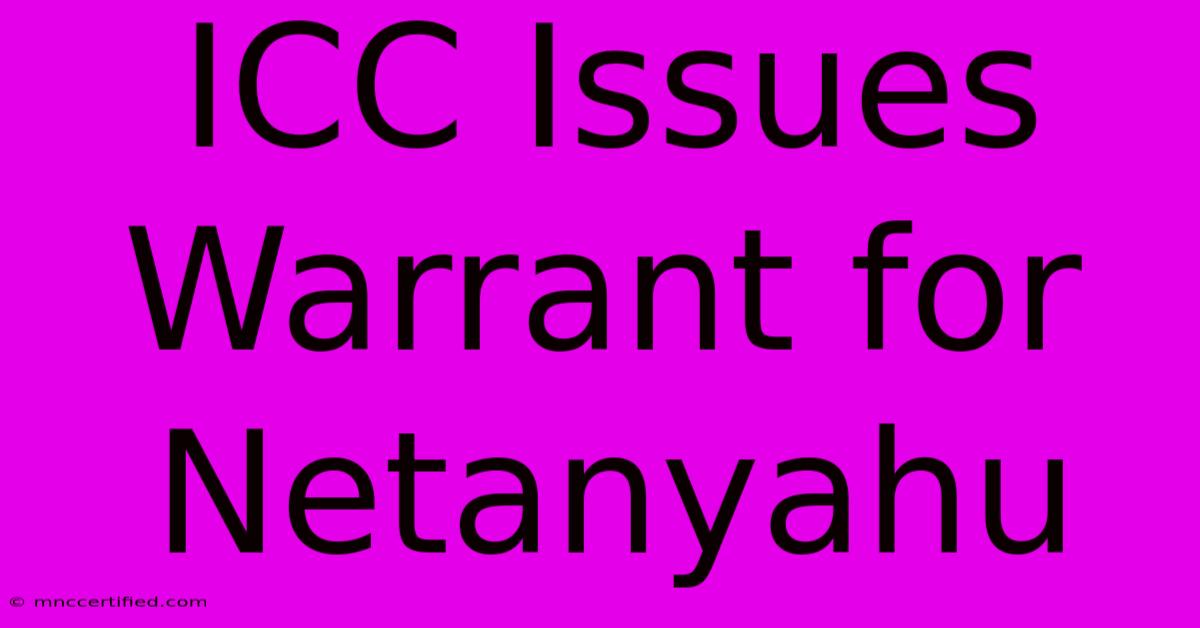ICC Issues Warrant For Netanyahu

Table of Contents
ICC Issues Warrant for Netanyahu: A Deep Dive into the Implications
The International Criminal Court (ICC) issuing an arrest warrant for Benjamin Netanyahu, Israel's former Prime Minister, is a monumental event with far-reaching global implications. This unprecedented action warrants a thorough examination of the circumstances, the legal basis, and the potential consequences.
Understanding the ICC's Warrant
On [Insert Date of Warrant Issuance], the ICC issued an arrest warrant for Benjamin Netanyahu, accusing him of war crimes and crimes against humanity related to the Israeli-Palestinian conflict. The specific charges, as detailed in the warrant, are crucial to understanding the gravity of the situation. [Insert specific charges from the warrant here – e.g., alleged unlawful transfer of Palestinian populations, attacks on civilians, etc.] This isn't simply a political statement; it's a formal legal process initiated by an international body with the power to prosecute individuals for grave crimes under international law.
What are the legal grounds for the warrant?
The ICC's jurisdiction is based on the Rome Statute, an international treaty establishing the court. Israel is not a signatory to the Rome Statute, however, the ICC asserts jurisdiction based on the principle of universal jurisdiction and the fact that the alleged crimes occurred within the territories occupied by Israel, which are considered under the Court's jurisdiction. This jurisdictional claim is a significant point of contention and a major area of legal debate.
The Political Fallout: Domestic and International Reactions
The ICC's decision has ignited a firestorm of political reactions, both domestically within Israel and internationally. Israel has vehemently condemned the warrant, calling it politically motivated and a blatant attack on Israeli sovereignty. The Israeli government has announced [insert government response – e.g., it will not cooperate with the ICC, it will take retaliatory measures, etc.].
Internationally, reactions have been divided. Supporters of the warrant applaud the ICC's efforts to hold powerful individuals accountable for alleged atrocities. Others criticize the decision, raising concerns about the potential for bias and the impact on the peace process. [Include specific reactions from key countries or international organizations here – e.g., statements from the US, EU, UN, etc.] The situation is further complicated by the existing geopolitical tensions in the region.
The Impact on the Israeli-Palestinian Conflict
The ICC's warrant adds another layer of complexity to the already volatile Israeli-Palestinian conflict. It could potentially exacerbate tensions, hinder peace negotiations, and further polarize public opinion. The long-term consequences on the peace process remain uncertain, but the immediate impact is undoubtedly significant. The possibility of future investigations and prosecutions related to the conflict remains a looming concern.
The Future: Potential Outcomes and Challenges
The future implications of this warrant are multifaceted and unpredictable. Several scenarios are possible:
- Netanyahu's arrest: If Netanyahu travels to a country that recognizes the ICC's jurisdiction, he could be arrested and potentially extradited to The Hague.
- Non-cooperation: Israel’s refusal to cooperate could severely limit the ICC's ability to effectively investigate and prosecute the case.
- Political maneuvering: The situation could be exploited by various political actors to advance their agendas, potentially hindering efforts toward peace and reconciliation.
The ICC's warrant for Netanyahu's arrest is a watershed moment with significant implications for international criminal law, the Israeli-Palestinian conflict, and global politics. The legal battles, political responses, and long-term consequences will undoubtedly shape the international landscape for years to come. Further updates and analysis will be crucial in understanding the evolving situation.
Keywords: ICC, International Criminal Court, Benjamin Netanyahu, arrest warrant, war crimes, crimes against humanity, Israeli-Palestinian conflict, Rome Statute, universal jurisdiction, international law, political implications, geopolitical tensions, peace process.

Thank you for visiting our website wich cover about ICC Issues Warrant For Netanyahu. We hope the information provided has been useful to you. Feel free to contact us if you have any questions or need further assistance. See you next time and dont miss to bookmark.
Featured Posts
-
Arrest Warrants Issued Icc Action
Nov 22, 2024
-
Business Insurance Fort Worth Tx
Nov 22, 2024
-
Commercial Crime Insurance Forms
Nov 22, 2024
-
Icelands Grindavik Another Volcanic Eruption
Nov 22, 2024
-
Reverend Richard Coles Biography And Work
Nov 22, 2024